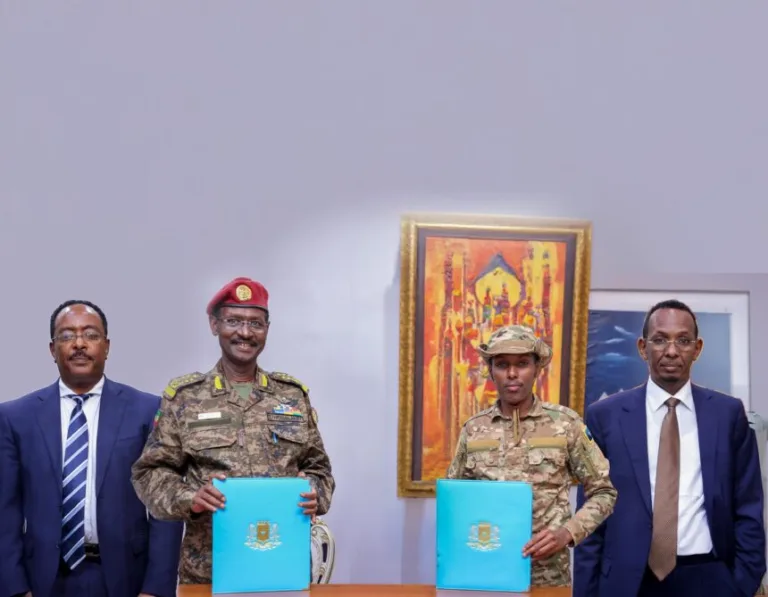In what appears to be a major development since Ethiopia and Somalia signed the Ankara Agreement to resolve tensions following the MoU the former signed with Somaliland, the two countries are taking practical steps to improve their relations.
It is too early to tell whether the agreement will take root at this point. Somalia has signed a tripartite agreement with Egypt and Eritrea—countries with which Ethiopia has hostile relations. There are even predictions that Eritrea and Ethiopia might go to war, as their relationship is worsening. Eritrea has deepened its military mobilization in recent weeks.
What is known for the time being is that Ethiopian forces’ deployment as part of the new African Mission in Somalia is confirmed. Ethiopian Defense Chief Field Marshal Berhanu Jula and the Intelligence Chief were in Somalia on Sunday. An agreement was signed.
Defense Force Chiefs from the two countries have released a joint communique in Mogadishu. Somalia state owned news agency published the full content of the Joint Communique :
“JOINT COMMUNIQUE ON THE OCCASION OF THE WORK VISIT BY THE CHIEF OF ETHIOPIA NATIONAL DEFENCE FORCE FIELD MARSHAL BIRHANU JULA OF THE FEDERAL DEMOCRATIC REPUBLIC OF ETHIOPIA TO SOMALIA
- Following the recent Bilateral engagement between H.E Dr. Hassan Sheikh Mohamud, President of the Federal Republic of Somalia and H.E Dr. Abiy Ahmed, the Prime Minister of the Federal Democratic Republic of Ethiopia in Addis Ababa, Ethiopia on 14-16 February 2025, it was agreed that a technical discussion was to be held in Mogadishu Somalia.
- Based on the above instructions a delegation led by Field Marshal Birhanu Jula, Chief of Ethiopia National Defence Force paid a one-day Work Visit to the Federal Republic of Somalia on 22ND February 2025. The Chief was accompanied by the head of the National Intelligence and Security Service (NISS), Redwan Hussein and other Government Officials.
- Maj. Gen Odawa Yusuf Rage, Chief of Defense Forces of the Somali National Armed Forces of the Federal Republic of Somalia and Amb. Abdullahi Mohamed Ali Director of National Intelligence and Security Agency (NISA) welcomed Field Marshal General Birhanu Jula and RedwanHussein to Somalia and commended the strongbilateral cooperation between the two countries.
- The chiefs exchanged views on the security situation in Somalia and the region and underscored the need to maintain peace, security and stability in the Horn of Africa and in the African continent. They paid tribute to the Troop and Police Contributing Countries (T/PCCs) of the AU MISSION in Somalia (AMISOM)/ATMIS and Somali Security Forces for the sacrifices made since 2007 in pacifying the country and the fight against Al-Shabaab.
- The Chiefs welcomed the commencement of the African Union Support and Stabilization Mission in Somalia (AUSSOM) and highlighted the importance of building on the achievements made by its predecessor ATMIS. The chiefs underscored the role of ENDF in African Union peace support operations and agreed on the Force disposition of ENDF in the African Union Support and Stabilization mission in Somalia (AUSSOM).
- The Chiefs emphasized the need to adequately support the current efforts to fight al-Shabaab and underscored their commitment to jointly work together to counter terrorism.
- The parties agreed that the Federal Government of Somalia will be the only point of entry for any engagement between the Federal Democratic Republic of Ethiopia and Federal Republic of Somalia and to respect the sovereignty, territorial integrity and unity of its people.
- The Chiefs called upon to the international community to support in building the capabilities of the Somali National Armed Forces to ensure the smooth exit of AUSSOM and pave way for Somalia to assume her security responsibilities.
- At bilateral level, the Chiefs agreed to develop a Status of Force Agreement a (SOFA) for all the bilateral forces that will operate in Somalia, the signing of the SOFA will be integral part of the Memorandum of Understanding on Defence Cooperation that was signed in December 2023.” Horseed Media






